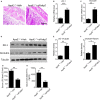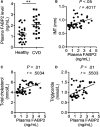Intestinal fatty acid-binding protein mediates atherosclerotic progress through increasing intestinal inflammation and permeability
- PMID: 32220004
- PMCID: PMC7205806
- DOI: 10.1111/jcmm.15173
Intestinal fatty acid-binding protein mediates atherosclerotic progress through increasing intestinal inflammation and permeability
Retraction in
-
Retraction.J Cell Mol Med. 2022 Feb;26(3):955. doi: 10.1111/jcmm.17151. Epub 2022 Jan 10. J Cell Mol Med. 2022. PMID: 35001505 Free PMC article. No abstract available.
Abstract
Atherosclerosis is one of leading phenotypes of cardiovascular diseases, featured with increased vascular intima-media thickness (IMT) and unstable plaques. The interaction between gastrointestinal system and cardiovascular homeostasis is emerging as a hot topic. Therefore, the present study aimed to explore the role of an intestinal protein, intestinal fatty acid-binding protein (I-FABP/FABP2) in the atherosclerotic progress. In western diet-fed ApoE-/- mice, FABP2 was highly expressed in intestine. Silence of intestinal Fabp2 attenuated western diet-induced atherosclerotic phenotypes, including decreasing toxic lipid accumulation, vascular fibrosis and inflammatory response. Mechanistically, intestinal Fabp2 knockdown improved intestinal permeability through increasing the expression of tight junction proteins. Meanwhile, intestinal Fabp2 knockdown mice exhibited down-regulation of intestinal inflammation in western diet-fed ApoE-/- mice. In clinical patients, the circulating level of FABP2 was obviously increased in patients with cardiovascular disease and positively correlated with the value of carotid intima-media thickness, total cholesterol and triglyceride. In conclusion, FABP2-induced intestinal permeability could address a potential role of gastrointestinal system in the development of atherosclerosis, and targeting on intestinal FABP2 might provide a therapeutic approach to protect against atherosclerosis.
Keywords: atherosclerosis; inflammation; intestinal fatty acid-binding protein; intestinal permeability.
© 2020 The Authors. Journal of Cellular and Molecular Medicine published by Foundation for Cellular and Molecular Medicine and John Wiley & Sons Ltd.
Conflict of interest statement
The authors declare that they have no conflicts of interest.
Figures





References
-
- Jonsson AL, Backhed F. Role of gut microbiota in atherosclerosis. Nat Rev Cardiol. 2017;14:79‐87. - PubMed
-
- Cani PD, Amar J, Iglesias MA, et al. Metabolic endotoxemia initiates obesity and insulin resistance. Diabetes. 2007;56:1761‐1772. - PubMed
-
- Li J, Lin S, Vanhoutte PM, Woo CW, Xu A. Akkermansia Muciniphila Protects Against Atherosclerosis by Preventing Metabolic Endotoxemia‐Induced Inflammation in Apoe−/− Mice. Circulation. 2016;133:2434‐2446. - PubMed
Publication types
MeSH terms
Substances
LinkOut - more resources
Full Text Sources
Medical
Research Materials
Miscellaneous

